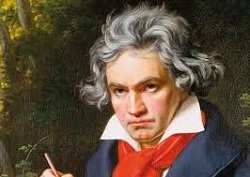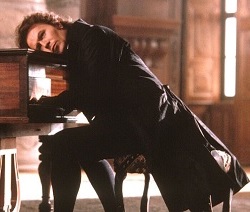Feb 22, 2026
Feb 22, 2026
The prolonged lockdown days, I feel, have unusually long mornings, long afternoons and long evenings, making it rather difficult to while away what appears to be Time in Slow Motion within the four walls of Home, Sweet Home.
Venturing out, we are cautioned, is hazardous, especially for the elderly. But the other option of staying home with nothing better to do than be glued to the television set, watching news, views, serials and atrocious comedy shows, in other words serial killings, is equally hazardous, if not more. Any analysis will show that much of the stuff touches the wrong nerves up in the brain, causing anger, frustration or bitterness.
 It is this thought that prompted me one day to digress a little and listen to some pristine music produced by the world’s great masters, music from across the continents and across the centuries.
It is this thought that prompted me one day to digress a little and listen to some pristine music produced by the world’s great masters, music from across the continents and across the centuries.
So I gave temporary adieu to the television set, switched on my son’s turntable, selected one long-play record from the rack, to begin with, and settled down in an easy chair for a long session to listen to the music of the spheres, condensed, distilled, sublimated to ethereal musical notes by a man who could hear absolutely nothing: Beethoven.
From an attractive set of all his nine symphonies, gifted from abroad a long time ago by an old classmate, I chose the Ninth, the ultimate in Beethoven music and one of the most loved musical compositions ever in the world.
No wonder the Ninth symphony puts many on cloud nine. From its First movement to the Fourth, from the walking paced Andante to the fast paced Allegro, or even the very fast paced Presto, from the silence of the interludes to the deafening chorus of Schiller’s Ode to Joy, every second of the Ninth is entertaining, enthralling and ennobling music. And every second of it one keeps wondering how a man who could not hear anything could create such heavenly music. How he could visualize the grand orchestra and the sounds that come from a great array of wood, brass and percussion instruments, and the voice of the soloists and the large chorus? And create separate musical notes for each of the varied instruments, like flutes and clarinets, oboes and trombones, horns and trumpets, violins and violas, drums and cymbals, the voice of the soloists, and of the chorus, and integrate all that into a wholesome whole, without being able to hear even a single note?
The feeling that we may have when listening to the Ninth, therefore, is not only great adulation for its creator, but utmost sympathy for him as well.
The high point of the Ninth is obviously the Choral part in the Fourth movement, where Friedrich Schiller's celebrated poem Ode to Joy is given a great and everlasting musical interpretation.The Ode, by which Beethoven joined Schiller in celebration of universal brotherhood and unity of mankind, also created history as it was for the first time in western classical music tradition that a major composer used voices in a symphony.
Beethoven's musical score for the Ode was honoured as the anthem of Europe in 1972 and subsequently chosen as the anthem of the European Union.
The Ninth was not the only symphony Beethoven created when he was deaf. Barring the First Symphony, composed in 1800 when he was thirty, all his output in subsequent years till his death at the age of 57 were silent symphonies. From the age of 32 he began experiencing progressive hearing loss, and he became totally deaf much before he composed the Ninth.
 There is a touching scene in a film on him, Immortal Beloved, where he is shown as resting his head on the extended cover of a piano. Anyone would take him to have dozed off on his piano. But he was pressing his ear hard on the piano, straining himself a great deal, to feel the vibrations of the piano strings as he was fingering the keys, composing his great Moonlight Sonata.
There is a touching scene in a film on him, Immortal Beloved, where he is shown as resting his head on the extended cover of a piano. Anyone would take him to have dozed off on his piano. But he was pressing his ear hard on the piano, straining himself a great deal, to feel the vibrations of the piano strings as he was fingering the keys, composing his great Moonlight Sonata.
Despite the progressive loss of hearing, he ventured to conduct his Third Symphony, Eroica, and the Sixth, Pastoral, when they were premiered, but refrained from all public performances subsequently. (Incidentally Beethoven initially dedicated Eroica to Napoleon but tore off the dedication page when Napoleon declared himself Emperor of France. And the Pastoral is literally a walk through the woods as we can hear the gurgling sounds of streams and the sounds of singing birds).
The only exception in public performance was when he chose to conduct his last symphony, the Ninth, which was premiered in Vienna on 7 May 1827. Though Beethoven was in front of the orchestra, frantically conducting, the actual conducting was done by the music director of the concert hall who had instructed the artistes to follow his baton and not Beethoven’s.
Unable to hear anything of his own music from that grand orchestra, it was said Beethoven continued to wave and flail his baton even after the music had ended and the audience had started giving him a standing ovation. One of the four women soloists of the choral group then came up to him to gently turn him around so that he could see the audience reaction. As he could not hear their applause, the audience, in great sympathy, waved their hands and threw their handkerchiefs up to show him their appreciation and admiration.
Though the film on him, like the film on Mozart, Amadeus, departed a great deal from history and brought in a lot of fiction, the concert hall scene was true to history.
Apart from the great symphonies, many of his other famous musical pieces, in categories like chamber music, concertos, sonatas, rondos, piano solos etc, were composed by him when he was hard of hearing. This includes the lilting melody Fur Elise (For Elise), a piano solo piece that is one of Beethoven’s most popular compositions.
Elise to whom this lovely composition was dedicated was one of the two mysterious women in his life. Beethoven never married though there were many women with whom he was close. There was much speculation when after his death his manager and friend found in his papers an unsent love letter addressed simply to ‘Immortal Beloved.’ There was nothing in it to show either the date of the letter or the identity of the intended recipient. This naturally sparked a lot of research into his life by Beethoven scholars who came up with the names of at least three contenders, with all of whom he had very close relations. The same was the case with the identity of Elise, with three names suggested as the possible real life Elise.
The unsent love letter gave the biopic on him not only a title, Immortal Beloved, but also a thread to unravel his life. The film shows his friend and manager meeting the many women known to Beethoven in a bid to identify the letter’s intended recipient. In the process Beethoven’s life is unfolded in flashback.
It was an intense desire of young Beethoven to learn music under Mozart, who was at that time acknowledged as the greatest living composer in Europe. His patrons in Bonn sent him to Vienna for this purpose and he carried with him a commendation letter to Mozart from someone known to him.
Though Beethoven had to return to Bonn immediately in view of his mother’s terminal illness, he did have a meeting with Mozart. Legend has it that when Mozart asked him to play the piano, Beethoven played a piece composed by the great master himself. But Mozart asked him play something of his own. When he did it Mozart was greatly pleased. He ran to the next room to call out his wife Constance and said: “Stanzi, Stanzi, watch out for that boy, someday he will give the world something to talk about.”
16-May-2020
More by : P. Ravindran Nayar